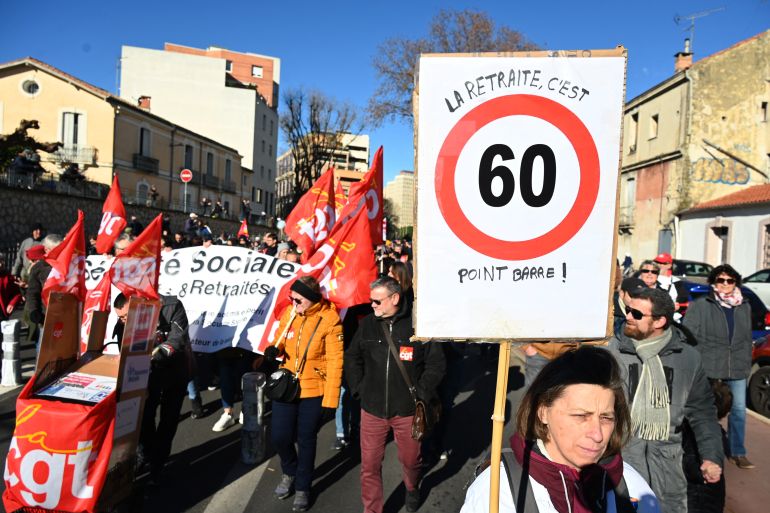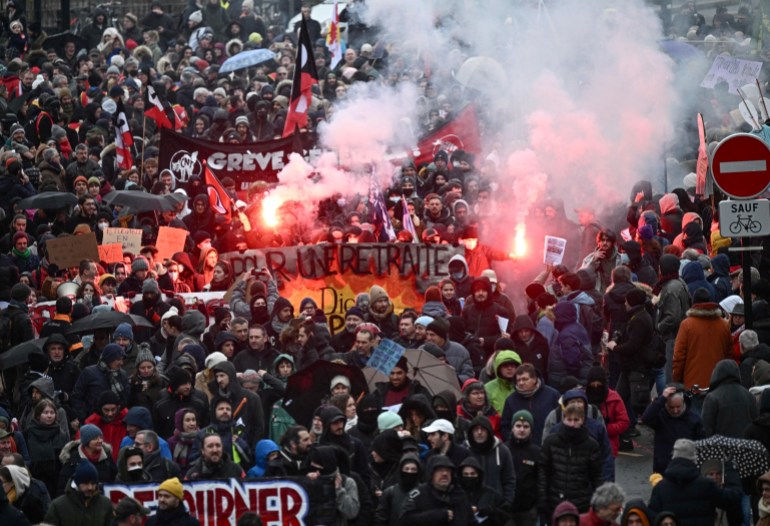French workers, angered by Macron’s pension plan, strike en masse
Hundreds of thousands walk off in protest against the government’s plan to raise the pension age to 64.

Teachers, train drivers, and refinery workers in France are among those who have joined a nationwide day of strikes, as anger rages over the government’s plans to raise the pension age by two years to 64.
The protests are a major test for President Emmanuel Macron, who maintains that his pension reform plan – which is highly unfavourable in opinion polls, with 68 percent of people against an increase – is crucial for the economy.
Keep reading
list of 3 itemsFrance places Paris shooting suspect under formal probe
France, UK impose COVID curbs on arrivals from China
French trade unions called for Thursday’s mass mobilisation. The last time they did that was 12 years ago, when the retirement age was increased from 60 to 62.
“We need a lot of people to join the protests,” Laurent Berger, head of France’s largest union, CFDT, told BFM TV.
“People are against this reform … we need to show it [in the streets].”
While French labour ministry estimates say retirement reform would bring in an additional 17.7bn euros ($19.1bn) in annual pension contributions, allowing the system to break even by 2027, unions say there are other ways to ensure the viability of the pension system, such as increasing taxes for the superrich.
Al Jazeera’s Bernard Smith, reporting from Paris, said 12 of France’s biggest unions joined hands to lead the protest.
“That in itself is unusual [because] the unions are rarely united,” he said.
“[They’re] hoping to turn this protest into some sort of broader social movement combining concerns about the continuing cost-of-living crisis to really put pressure on the president.
“President Macron has always cast himself as a reformer. In his first run for the presidency, he said he would reform France. He tried to push through pension reforms, and other reforms, in his first term. [But] protests stopped him doing that, and then the pandemic stopped him doing that. So [in] his second term, he’s trying again.”

For Macron, the pension plans put his reformist credentials at stake, both in the country and among his European Union peers, as a way to keep public spending down.
Anne-Elisabeth Moutet, a journalist with The Telegraph, told Al Jazeera: “The feeling among the workers in France and the unions is [that] this reform is essentially pushing people to work longer, [and] they will not find jobs because in France [there are] unemployment problems.”
Moutet explained that despite the protests, the reform plan will most likely pass thanks to Macron’s deal with the main conservative party, Les Republicans.
Hundreds of thousands are rallying, including tens of thousands in the capital, Paris.
Paris’s public transport is being brought to a standstill and trains will struggle to run throughout France.
According to the main teachers union, 70 percent of primary teachers are striking as many schools close for the day.
“There’s nothing good in this reform,” said Rozenn Cros, in the southern French city of Cannes, as she and other teachers prepared to strike with banners including “No to 64”.
Macron’s last attempt at pension reform in 2019 was halted a year later when the COVID-19 pandemic hit Europe.
Al Jazeera’s Smith said Macron “wants some sort of legacy”.
“Without this, he does not have a legacy. [If the reform does not pass with a coalition with Le Republicans] there is a constitutional way he can force this change in the law, but if he does that, it will probably provoke a new legislative election. Without these reforms, if Macron has to retreat, then that leaves him as a lame duck president with very little power or influence.”